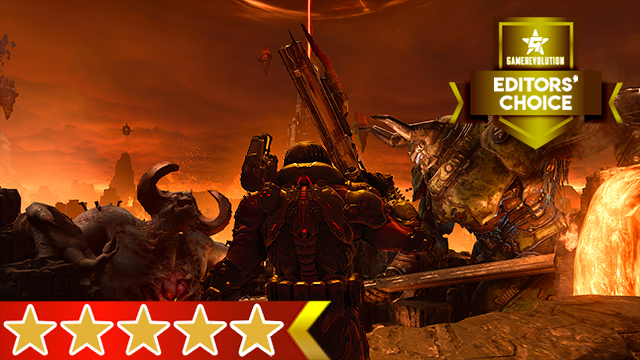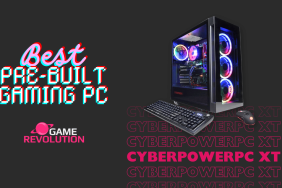Following up smashing success hasn’t been Doom’s strong suit. Doom 3, the long silence that followed, and the ill-fated Doom 4 are striking examples of the series being damned by its own past achievements. But the Doom Slayer kills damned things for a living and eviscerated that slump with the spectacular 2016 reboot; a surprising accomplishment that puts DOOM ETERNAL in the same hellish hot seat that has doomed others before it. Although instead of burning to ash in that hot seat, Eternal rips and tears it wide open, resulting in a more varied and streamlined version of the one the best first-person shooters ever created.
Doom (2016) was such a landmark shooter for many reasons but mostly because of its gameplay. Adapting the 1993 mindset of the debut, the reboot was remarkably fast and pushed you to use your trigger finger and brain to kill and refill your dwindling resources as quickly as possible. The breakneck pacing (buoyed by the high and stable frame rate) meant that every fight had an improvisational feel to it since you weren’t afforded the time to sit back and strategize; your approach had to be decided as you were mere inches from the nearest horned hellspawn. It was like jazz, but with slightly more murder.
Doom Eternal Review | More tools of the (demon-slaying) trade
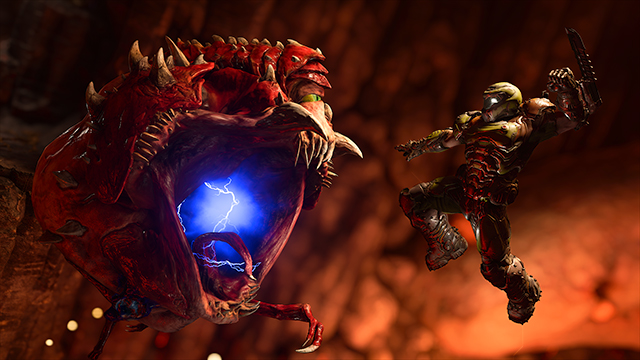
Despite the Doom Slayer’s penchant for dismemberment, Eternal has left that beating heart of the franchise intact. Chaining shotgun blasts and guided rocket barrages while ensuring to frequently Glory Kill and rev the chainsaw to refill your resources is still the rush it was back in 2016. No other game has even come close to matching the near-perfect nexus of speed and strategy that this formula naturally has and, given the dearth of meaningful competition, is still an utter blast to perform every time.
But without expanding upon that, Doom Eternal would be a poor sequel and instead of merely using a bigger scale as a cheap marketing bullet point, the game uses its newfound additions to improve almost everything. While the returning array of armaments has seen some worthy changes, the most substantial new inclusions are the Flame Belch, ice grenade, and Blood Punch. The Flame Belch mini-flamethrower is useful for burning armor out of foes. The ice grenade allows for better crowd control or combo potential. And the Blood Punch, once charged, turns your melee into a shockwave that is handy for instantly slaughtering groups of fodder and staggering bigger demons.
ALSO: Doom Eternal and Animal Crossing fans share the strangest friendship on the internet
Doom’s chess-like combat encounters are exponentially better when there are more pieces at play, especially when those pieces have distinct gameplay benefits. Choosing when to use what ability is just another quick decision you have to make that yields even more depth as you have to constantly remember what you have loaded and what’s on cooldown in the heat of the moment. The weapons also play a big role in this as the array of primary and secondary fires are more toys that feed both the bloodthirsty and analytical sides of your brain.
Eternal intelligently forces you to use every part of your loadout, too, as none of your many tools has much ammo. Ostensibly, by slightly starving you of resources, you’re required to constantly hunt for what you need and switch up your playstyle in the process. It’s an ingenious way for the mechanics push the player to play the game at its best: laying waste to every demon while also not wasting any part of its arsenal.
Doom (2016) only wasted one part of its arsenal: the crouch button. Id has replaced it with a dash that, when combined with the new monkey bars and the grappling hook on the Super Shotgun, make the already mobile Doom Slayer considerably more mobile. Cranking up the speed to 12 is more thrilling and demonstrates how Doom is better the faster it is played. While just an illusion founded upon Eternal’s higher speed, it almost makes the 2016 reboot seem slow. Almost.
Doom Eternal Review | Killer pacing to kill to
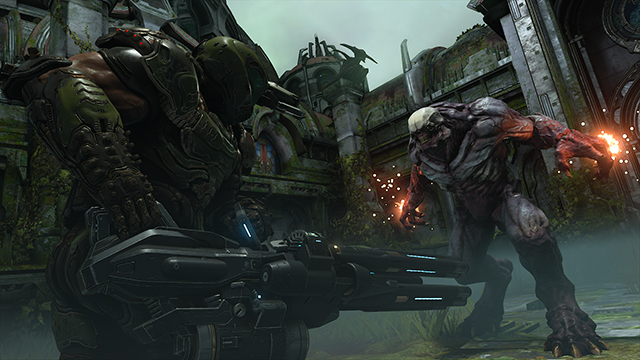
All of these mobility and weapon upgrades are also evenly spread over the game’s runtime. Carefully doling out these new toys repeatedly gives you something else to master and once you’ve grasped one ability or weapon, another is dropped in your lap or hidden behind a secret cracked wall. Masterful pacing ensures that you start as a badass and only get continually more badass until the final encounter, which is an engaging approach more games ought to steal.
The enemies and level design put the Doom Slayer’s enhanced armory to the test and bring out its best parts. Eternal has a much larger array of demons and every one has a certain style and level of danger. Prioritizing threats and what instrument fits the job is Doom at its very core and having a bigger pool to pull from allows for an endless supply of fresh encounters.
It never comes close to exhausting all of the possible permutations, something the remixed Master Levels (more of which are coming soon) effortlessly showcase. Eternal’s constantly growing lineup of monsters allows for some devilishly devious combinations, but that’s one of the game’s most outstanding assets. Through its various weapons, upgrades, abilities, and enemies, the game is designed in a way to never stagnate as there is always some way to rearrange its multitude of variables and create an original encounter.
Doom Eternal Review | Hell on Earth
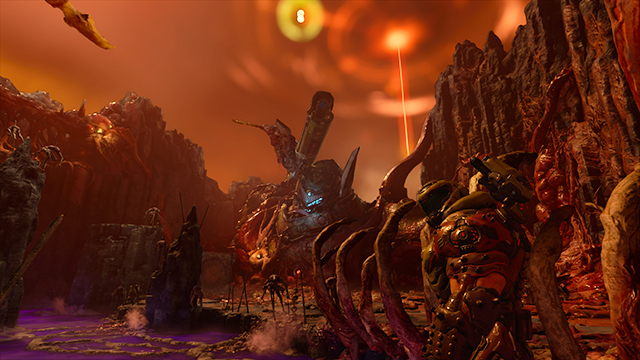
Environments contribute to this ever-cycling sense of originality and are the unspoken hero in and outside of combat. Stages have more intricate geography with interesting setups outside of the combat arenas. Climbable walls and the aerial dash make platforming more involving and are simple yet effective ways to break up each demonic skirmish. Nothing can top the shooting — and the other parts don’t try to — but it cleverly uses the mobility that’s integral to the shooting to make the other parts of the game even better.
But it also looks different as Eternal shifts Doom away from the franchise’s safe places — Hell and Mars — and goes in some bold new directions. Mars and Hell are only sparingly done, but each have better, more involved vistas than any other entry in the series. It even goes outside of the normal red and orange hues, relying on bright purples, yellows, and greens that look like if Hell vomited on an open cadaver after downing six bags of Skittles. The Cronenbergian, fleshy Hell and Earth fusions are still the haunting highlights, even if a small handful of the normal buildings within them are drab by comparison. While not bland or attratively grotesque, the other angelic and icy environments are striking in other ways and illustrate how solid art direction can successfully guide a game out of its comfort zone.
Doom Eternal, through its hardcore art design and kinetic combat loop, is extremely metal and its soundtrack is the aural linchpin that ties it all together. Ambient tunes bubble with intensity, filling in the quieter respites, but then explode as Satan’s forces materialize and is the audio adrenaline that perfectly pairs with the onscreen carnage. Few games have such an intimate connection to their music, which stands incredibly well by itself, but is infinitely better in the game; a feat few titles in the medium can claim.
Doom Eternal Review | Metaphorically unmasking the Doom Slayer
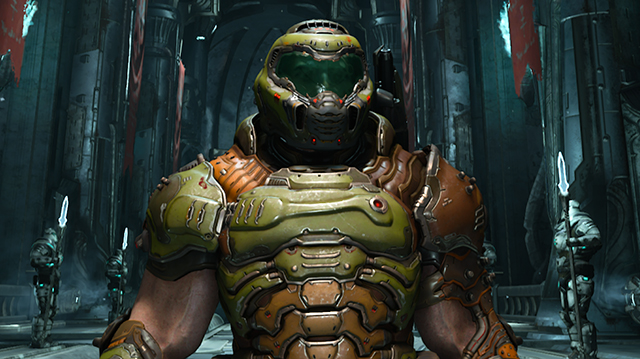
Given all the banging metal and big fuckin’ guns, Doom Eternal sounds like it would have the narrative depth of the first five minutes of a porno. Instead, it tells an unobtrusive tale that doesn’t impede the gameplay and rewards those who pay attention. Scenes are brief and effective at conveying the necessary information while also pointing more lore-hungry players to the optional codex.
Be it the journal, the cutscenes, or both, the game efficiently expresses the unexpectedly poignant themes of its plot along with the backstory of its world and protagonist. While other aspects like the soundtrack, weapons, and Easter eggs pay homage to past entries, its narrative might hold the most respect for its history without going overboard. It may lack a bit of the charming nonchalance of the reboot, but it’s still an effective example of economical, restrained action game storytelling.
Doom Eternal has a lot in common with Doom 2. Both could never dream of matching the surprise or legacy of their immediate predecessor, but they each confidently expand on the historic foundations those games set. Using fast-paced first-person shooting as the framework, each sequel has wildly improved level design, a wider selection of demons to massacre, and a larger arsenal that come together to refine its core identity in the smartest, most respectful ways possible. However, Eternal is more ambitious than its 1994 counterpart, pushing even further and creating one of the best first-person shooters ever made in the process. The Doom Slayer has faced many nightmarish opponents and toppled them all, yet his greatest victory might be slaying the impossibly high expectations set by his genre-defining precursors.
We’ve now gotten to extensively play Battlemode and while it doesn’t change the score, here are our thoughts.
Doom Eternal Review | Multislayer
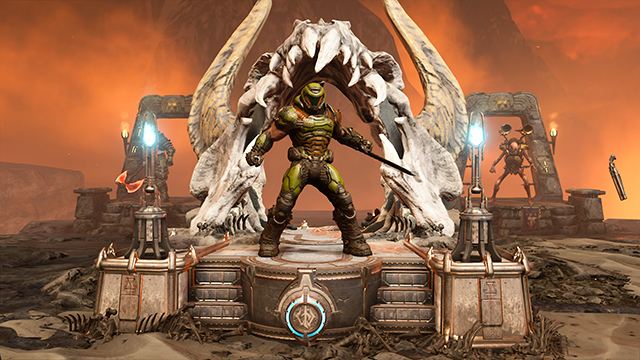
While Doom Eternal’s campaign is an experience that can stand on its own, it doesn’t have to. Battlemode, instead of a functional but dry assortment of deathmatch modes, pits two player-controlled demons against one juiced up Slayer. It isn’t just a throwaway mode like the reboot either, as it meaningfully adds to the game despite its occasional hiccups.
Like Modern Warfare’s Gun Fight, it’s a more intimate affair that automatically dials up the action because there are fewer people to absorb the pressure. And given that it directly borrows so many of the mechanics from the campaign, it’s already filled with an excess of adrenaline. Playing as the Slayer is empowering because you can do almost everything an endgame Slayer can with most of the same upgrades, weapons, and abilities. Nothing gets lost in translation — a huge positive for a game with such strong solo mechanics — and using those single-players against real people is exhilarating.
The demons are essentially all new but they’re still a blast to control. Each hellspawn has its own style (that you can master in the effective tutorials) and using those unique powers in cooperation with your demonic partner to squeeze the Slayer strikes a different type of rhythm that is similarly as engaging. Demons can summon other A.I. demons, too, as well as create healing bubbles or hazardous zones, depending on what of the two variants you pick. Each of the three people also get to pick an upgrade after each match, further introducing more strategic options.
It’s simple yet still has plenty of depth, given all the possible ways to use your tools. Thanks to id’s work on the core mechanics, the micro gameplay loops are sound so it doesn’t need to lean heavily on upgrades or an array of loadouts. It just uses them to augment some of the best first-person shooting out there.
Unlock systems can also help enhance any online game, but there aren’t many of them here, at least natively. A sizable portion of the cosmetics are exclusive to different editions, the Slayers Club, pre-ordering, timed events, playing the other Doom games, or some other weird extracurricular marketing campaign. While it’s fantastic that both halves of the game use the same skins and challenges, this leaves little in the actual game for regular people to unlock and thus a shorter metagame. The sheer unique concept of the mode carries it quite far — not every game needs Call of Duty levels of experience bars and unlockables — but a few more cosmetics to chase in the actual game would have been ideal.
Its abbreviated metagame hook isn’t as much of a problem when compared to its bugs. The game will sometimes automatically empty all of your gadgets, blare the sound effects, not give you experience until well after a match, fail to put on the skin you chose, or lag without warning. Nothing damns Battlemode to the fiery underworld and many of these sound like something a patch or two could fix, but they stick out when the campaign is as sharp as they come. Still, both modes together make for one hell of a rewarding package that pay homage to the past while aggressively pushing into new territory.
GameRevolution reviewed Doom Eternal on the PS4 with a copy provided by the publisher.
-
Extremely fast, satisfying gunplay that demands and rewards resourcefulness and aggression.
-
A steady flow of upgrades that continually ratchet up the intensity.
-
More involved level and combat design that prioritizes variety.
-
Environments have more color and go outside of the signature Doom locations.
-
Brilliant metal, rock, and electronic soundtrack that further amps up the action.
-
Unobtrusive yet interesting story that flows well and is expanded upon just enough in the optional codex.
-
Intense, inventive multiplayer that intelligently uses mechanics from the campaign in a new setting.
-
Some slight network issues.
